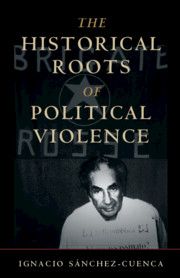Book contents
- The Historical Roots of Political Violence
- Cambridge Studies in Comparative Politics
- The Historical Roots of Political Violence
- Copyright page
- Contents
- Figures
- Tables
- Acknowledgments
- Abbreviations
- Introduction
- 1 The Argument
- 2 Revolutionary Terrorism and Its Ideological Roots
- 3 The Major Cases of Revolutionary Terrorism
- 4 Contemporary Effects and Background Conditions
- 5 The Long-Term Determinants of Revolutionary Terrorism
- 6 Historical Mechanisms
- 7 Individualism, Modernization, and Violence
- References
- Index
- Series page
1 - The Argument
From Development Paths in the Interwar Years to Revolutionary Terrorism in the 1970s
Published online by Cambridge University Press: 27 May 2019
- The Historical Roots of Political Violence
- Cambridge Studies in Comparative Politics
- The Historical Roots of Political Violence
- Copyright page
- Contents
- Figures
- Tables
- Acknowledgments
- Abbreviations
- Introduction
- 1 The Argument
- 2 Revolutionary Terrorism and Its Ideological Roots
- 3 The Major Cases of Revolutionary Terrorism
- 4 Contemporary Effects and Background Conditions
- 5 The Long-Term Determinants of Revolutionary Terrorism
- 6 Historical Mechanisms
- 7 Individualism, Modernization, and Violence
- References
- Index
- Series page
Summary
- Type
- Chapter
- Information
- The Historical Roots of Political ViolenceRevolutionary Terrorism in Affluent Countries, pp. 15 - 30Publisher: Cambridge University PressPrint publication year: 2019



